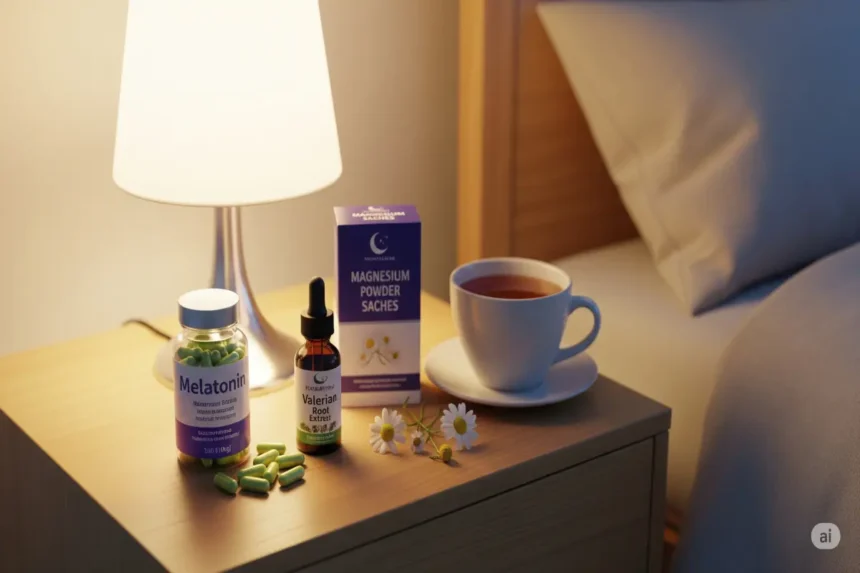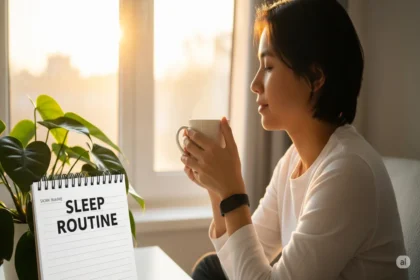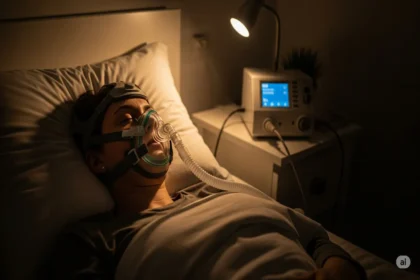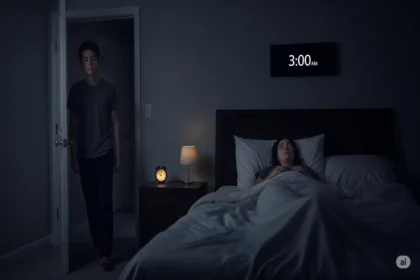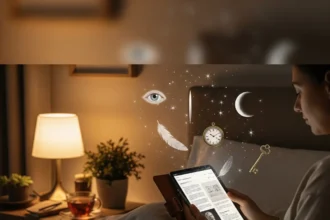In our relentless pursuit of productivity and achievement, sleep often becomes the first casualty. We burn the candle at both ends, fueled by caffeine and the misguided belief that more hours awake equate to more success. But as the shadows lengthen, and our minds refuse to quiet, many of us find ourselves staring at the ceiling, desperately wishing for the sweet oblivion of slumber. This nightly struggle has led to a burgeoning interest in natural sleep aids & supplements, promising a gentle nudge towards deeper, more restorative rest.
But with a bewildering array of tinctures, capsules, and powders lining the shelves, how do we discern between genuine support and mere hype? The world of natural sleep aids is vast and varied, steeped in both ancient wisdom and modern scientific inquiry. It’s a landscape where anecdotes often precede rigorous research, and where what works for one person might do nothing for another. So, let’s embark on a curious exploration, sifting through the evidence and understanding the mechanisms behind some of the most popular natural sleep allies.
The Melatonin Mystique: Our Body’s Own Sleep Messenger
If there’s one natural sleep aid that has truly entered the mainstream consciousness, it’s melatonin. Often hailed as a “natural sleep hormone,” melatonin is indeed produced by our pineal gland in response to darkness, signaling to our body that it’s time to wind down. Its role is to regulate our circadian rhythm, the internal 24-hour clock that dictates our sleep-wake cycle.
- The Science: Research largely supports melatonin’s efficacy in certain situations. It’s particularly effective for conditions involving a disrupted circadian rhythm, such as jet lag, shift work disorder, or delayed sleep-wake phase disorder (where your natural sleep time is much later than conventional hours). Studies show that even low doses (0.3 mg to 5 mg) can help to shift the sleep phase and reduce the time it takes to fall asleep. It’s not a sedative in the traditional sense; rather, it’s a chronobiotic, helping to tell your body what time it is.
- Considerations: While generally considered safe for short-term use, some individuals report side effects like headache, dizziness, nausea, or daytime grogginess, especially with higher doses. Crucially, less is often more with melatonin. High doses can sometimes lead to rebound insomnia or disrupt natural production. It’s not recommended for children without medical supervision. For conditions like chronic insomnia, addressing underlying sleep hygiene and behavioral factors is usually more effective than relying solely on melatonin.
Think of Alex, a flight attendant constantly battling jet lag. He found that taking a small dose of melatonin a couple of hours before his desired bedtime in a new time zone significantly helped reset his internal clock, allowing him to adapt faster and minimize the grogginess that used to plague him. For him, it wasn’t about knocking him out, but gently guiding his body into alignment.
Magnesium: The Mineral of Relaxation
Beyond its widely recognized roles in bone health and muscle function, magnesium has emerged as a popular natural sleep aid, often lauded for its calming properties.
- The Science: Magnesium is involved in over 300 biochemical reactions in the body, including those that influence sleep. It helps regulate neurotransmitters that are directly involved in sleep, such as Gamma-aminobutyric acid (GABA), an inhibitory neurotransmitter that calms the nervous system. Magnesium also plays a role in decreasing the stress hormone cortisol, and it can help relax muscles. Some research, particularly in older adults or those with magnesium deficiencies, suggests that supplementation can improve sleep quality, reduce time to fall asleep, and improve sleep duration.
- Considerations: Different forms of magnesium exist, and their absorption rates vary. Magnesium glycinate is often recommended for sleep due to its good bioavailability and less laxative effect compared to forms like magnesium citrate or oxide. While generally safe, excessive doses can lead to diarrhea, nausea, and abdominal cramping. It’s always best to consult with a healthcare professional, especially if you have kidney issues or are on other medications.
Sarah, a yoga instructor, noticed her sleep quality plummeting during particularly stressful periods. She’d wake frequently, her muscles feeling tense. A friend suggested magnesium, and after a few weeks of taking a glycinate supplement before bed, she found her sleep became deeper, her muscles felt more relaxed, and she woke feeling more refreshed. She still prioritizes her evening wind-down routine, but magnesium provided an extra layer of physiological calm.
Herbal Helpers: From Ancient Brews to Modern Capsules
The plant kingdom offers a rich tapestry of traditional remedies used for centuries to promote rest.
- Valerian Root: This herb has a long history of use as a sedative, dating back to ancient Greece and Rome.
- The Science: Valerian is thought to increase levels of GABA in the brain, similar to how anti-anxiety medications (benzodiazepines) work, but in a much milder fashion. Studies on its effectiveness for insomnia have yielded mixed results, with some showing modest benefits in improving sleep quality and reducing the time it takes to fall asleep, particularly with consistent use over several weeks.
- Considerations: Valerian can have a distinct, earthy smell. Side effects are usually mild and may include dizziness, headache, upset stomach, or vivid dreams. It’s advised to avoid it if you’re pregnant, breastfeeding, or taking other sedatives or alcohol, as it can amplify their effects. Some people report a “hangover” effect the next morning.
- Chamomile: Best known as a calming tea, chamomile’s gentle effects are widely recognized.
- The Science: Chamomile contains an antioxidant called apigenin, which binds to specific receptors in the brain that are associated with sleepiness and a reduction in anxiety. Some research suggests it can modestly improve sleep quality and reduce anxiety, particularly in those with mild insomnia or general anxiety. It may also influence melatonin levels.
- Considerations: Generally very safe with few side effects. However, those with allergies to ragweed, marigolds, or daisies should be cautious, as chamomile is in the same plant family and can trigger allergic reactions.
- Passionflower: Another popular herbal remedy for anxiety and insomnia.
- The Science: Passionflower is believed to boost GABA levels in the brain, helping to calm nervous activity. Research on its sleep-promoting effects is somewhat limited but generally positive, with some studies showing it can improve sleep quality and reduce anxiety.
- Considerations: It’s generally well-tolerated, but can cause drowsiness, dizziness, and confusion in some individuals. Avoid if pregnant or breastfeeding.
Beyond the Basics: Other Promising Contenders
The world of natural sleep aids is ever-evolving, with new research constantly emerging.
- L-Theanine: An amino acid found primarily in green tea.
- The Science: L-Theanine doesn’t induce drowsiness directly but promotes relaxation by increasing alpha brain waves (associated with a relaxed, alert state) and boosting levels of calming neurotransmitters like GABA, serotonin, and dopamine, while reducing excitatory ones. It may also lower stress hormones. Studies suggest it can reduce anxiety, improve sleep quality, and shorten sleep latency, particularly at doses of 200 mg or more.
- Considerations: Generally well-tolerated. Since it’s found in tea, it’s often combined with caffeine, so look for decaffeinated versions if using for sleep.
- Ashwagandha: An adaptogenic herb from Ayurvedic medicine, known for its stress-reducing properties.
- The Science: Ashwagandha (Withania somnifera) helps the body manage stress by modulating the hypothalamic-pituitary-adrenal (HPA) axis, which regulates cortisol (the stress hormone). By reducing stress and anxiety, it can indirectly improve sleep. Studies have shown it can enhance overall sleep quality, reduce sleep latency, and help people feel more alert upon waking. The effects often become more pronounced with consistent use over several weeks.
- Considerations: Generally safe for short-term use. Some people may experience mild side effects like stomach upset, diarrhea, or drowsiness.
- Tryptophan & 5-HTP: Precursors to serotonin and melatonin.
- The Science: L-tryptophan is an essential amino acid that the body converts into 5-hydroxytryptophan (5-HTP), which then converts into serotonin, a neurotransmitter involved in mood regulation and sleep, and eventually into melatonin. The idea is that providing these precursors can boost the body’s natural production of sleep-inducing compounds. Some studies suggest they can reduce the time it takes to fall asleep and improve sleep quality.
- Considerations: 5-HTP can cause gastrointestinal side effects. Both L-tryptophan and 5-HTP should be used with caution, especially if you are on antidepressants or other medications that affect serotonin, due to the risk of serotonin syndrome (a potentially serious condition caused by too much serotonin). Always consult a doctor before taking these.
- CBD (Cannabidiol): A non-intoxicating compound found in cannabis.
- The Science: Research on CBD for sleep is still emerging and often relies on anecdotal evidence, but early studies suggest it may help by reducing anxiety and pain, two common contributors to sleep disturbances. Some studies point to its potential to improve sleep quality, particularly at higher doses, though mechanisms are not fully understood and results can be mixed. It interacts with the endocannabinoid system, which plays a role in regulating various bodily functions, including sleep.
- Considerations: The CBD market is largely unregulated, leading to significant variability in product quality and purity. Dosage is highly individualized. Potential side effects include fatigue, diarrhea, and changes in appetite. It can also interact with certain medications, including blood thinners.
A Measured Approach: The Wise Path to Better Sleep
It’s tempting to view natural sleep aids as a magic bullet, a quick fix for our sleep woes. However, it’s crucial to approach them with a mindful and informed perspective.
Firstly, no supplement can truly compensate for poor sleep hygiene. Before reaching for any bottle, honestly assess your daily habits: your exposure to light, your consistent sleep schedule, your pre-sleep rituals, and your bedroom environment. These foundational elements of “sleep hygiene” are the bedrock of truly restorative rest. If your sleep sanctuary is a mess and your nightly routine is non-existent, even the most potent natural aid will struggle to make a lasting difference.
Secondly, the supplement industry is vast and not always well-regulated. Purity, dosage accuracy, and potential contaminants can be concerns. Always choose reputable brands that provide third-party testing results.
Finally, and perhaps most importantly, consult with a healthcare professional before incorporating any new supplement into your routine, especially if you have underlying health conditions, are pregnant or breastfeeding, or are taking other medications. They can help you understand potential interactions, appropriate dosages, and whether a supplement is truly the right path for your specific sleep challenges.
In the end, the journey to deeper sleep is deeply personal. For some, a carefully chosen natural sleep aid might provide that gentle nudge they need to drift off more easily. For others, the answer might lie entirely in lifestyle adjustments. The curiosity to explore, the intelligence to evaluate, and the wisdom to consult with experts – these are the true ingredients for unlocking the profound healing power of a good night’s sleep. And as the stars emerge tonight, may your path to slumber be peaceful, deep, and utterly rejuvenating.
Disclaimer: The information provided in this article is for general informational purposes only and does not constitute medical advice. It is not a substitute for professional medical advice, diagnosis, or treatment. Always seek the advice of your physician or other qualified health provider with any questions you may have regarding a medical condition. Never disregard professional medical advice or delay in seeking it because of something you have read on this website.

